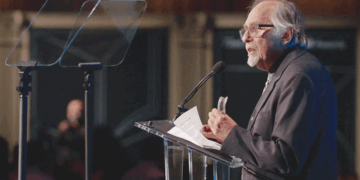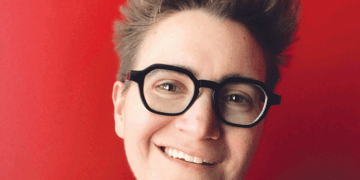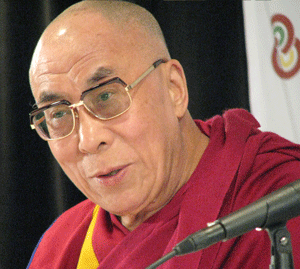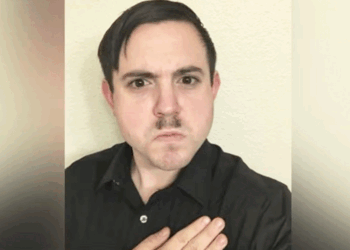I asked the Dalai Lama a question this past weekend.
Tenzin Gyatso, the man that Tibetans refer to as His Holiness the 14th Dalai Lama, visited Minnesota. He was hosted by the University of Minnesota’s Center for Spirituality and Healing and the Tibetan-American Foundation of Minnesota. The Twin Cities have the second largest Tibetan community in the United States.
A press conference with the Dalai Lama at the Marquette Hotel in downtown Minneapolis — conducted under the watchful eyes of U.S. State Department security agents — afforded the chance to pose a question to a veritable rock star of the spiritual world.
(The Dalai Lama has relinquished his role as political head of Tibet’s government in exile; he still reigns as the spiritual leader of Tibetan Buddhists, but says that he is “semi-retired.”)
In 1990, the Dalai Lama met with a Jewish delegation in Dharamsala, India. The meeting was described in detail by Rodger Kamenetz in his book The Jew in the Lotus. The Jewish scholars and rabbis were interested in the wisdom to be found in Tibetan Buddhism; the Dalai Lama and his advisors wanted to know about how Jews have survived as an exilic people (until relatively recently).
Two years ago, the Dalai Lama, on a visit to Washington, D.C. — where U.S. government officials shunned him publicly, in order not to offend the Chinese government — was welcomed in the sukka of Adas Israel Congregation. The synagogue also provided a room for the Dalai Lama to address 400 of his compatriots living in Washington.
“Right from the beginning, we always thought, ‘Oh, Jewish community must have some secret to preserve their tradition, several centuries, in some cases under hostile surroundings.’ You very successfully [have] preserved,” the Dalai Lama responded to my question about what he has learned about Jewish continuity and its lessons for Tibetans.
He mentioned that Tibetan and Jewish scholars and religious leaders have engaged in dialogue over the “last few decades.” From his “close contact” with Jews, the Dalai Lama has concluded that the Jewish preservation of traditions has depended “not on institutions, but on family-level” influence.
In the Tibetan context, as far as I could understand his answer, the role of family also has been critical in preserving the culture and Tibetan Buddhist religion. At the same time, the Dalai Lama cited the importance of the institutions of the Tibetan government in exile, which have been a source of communal support since the Chinese Communists violently invaded Tibet more than 50 years ago.
This chapter of Asian history is mainly unknown to most Americans. The Chinese Army invaded Tibet in 1950, and the following years saw guerrilla resistance and brutal repression. Finally, after a violent uprising in Lhasa, in 1959, the Dalai Lama fled across the border to India.
This is a brief inadequate historical sketch, but it evokes parallels to Jewish history. In The Jew in the Lotus, Kamenetz quotes Rabbi Irving “Yitz” Greenberg, who participated in the 1990 delegation to Dharamsala: “This is what the destruction of the Temple must have been like in Jewish history.” The reference is to the Roman conquest of Jerusalem and the dispersion of the Jews from their spiritual homeland for most of two millennia.
Kamenetz also quotes Rabbi Lawrence Kushner, who told the Dalai Lama in 1989: “The Chinese came to your people as the Germans came to ours.”
The Dalai Lama steadfastly articulates a philosophy of ahimsa, nonviolence towards all living creatures. He mentioned that he is a signatory to the Amnesty International petition for the abolition of capital punishment. This does not go down well in the U.S., which has a history of settling scores with a Colt .45 — or sending in the gunboats against the Barbary pirates, etc. Of course, a reporter asked the Dalai Lama about the killing of Osama bin Laden, and he responded that “dialogue is the only way” of resolving disputes. “When you use violence, even though your goal is justified… unexpected consequences often happen.”
The terrorist attacks on 9/11 were “very sad,” he commented, and mentioned that on Sept. 12, 2001, he wrote a letter to President George W. Bush, expressing condolences and suggesting that the U.S. respond nonviolently. Dubya obviously did not take his advice, and launched two wars that are still unresolved. Getting back to the assassination of bin Laden, the Dalai Lama suggested to Bush that mishandling the terrorist threat could have bad consequences — “that after five, 10 years, maybe 10 bin Ladens, 10 hundred bin Ladens, very possible.”
The Dalai Lama also mentioned the Nuremberg tribunal and the executions of Nazi war criminals after World War II.
“Yes, they committed very wrong things, but then, death sentence; I think… it is better [to let them live], then they see eventually their own past faults.” He also raised the possibility of rehabilitation, that a “merciless person, through affection, could be merciful, can change.”
With the existence of stockpiles of nuclear weapons — from the U.S. to Pakistan to North Korea — the resolution of international disputes takes on extreme urgency. We have known for many years that a regional conflagration — in the Middle East or elsewhere — could jump the firebreaks and lead to unimaginable destruction and bloodshed. There are manifold threats to our survival, and whether or not you agree with the nonviolent philosophy of the Dalai Lama, it is a philosophical viewpoint that’s worthy of consideration. War and repression have considerable downsides.
— Mordecai Specktor / editor [at] ajwnews [dot] com
(American Jewish World, 5.13.11)






















Comments 0